
Stress significantly contributes to hair loss, especially in women and those aged 31-40.
[object Object]  August 2023 in “Dermatologic Surgery”
August 2023 in “Dermatologic Surgery” Wounding may stimulate hair growth, but more research is needed to confirm the safety and effectiveness of related treatments.
 July 2023 in “Health Sciences Quarterly”
July 2023 in “Health Sciences Quarterly” Acne, dermatophytosis, and viral warts are the most common skin problems in a Turkish dermatology clinic.
 July 2023 in “Skin health and disease”
July 2023 in “Skin health and disease” Most UK survey participants had negative side effects from botulinum toxin injections, with many not fully recovering physically, emotionally, or financially.
 June 2023 in “British journal of dermatology/British journal of dermatology, Supplement”
June 2023 in “British journal of dermatology/British journal of dermatology, Supplement” Congenital alopecia areata may have genetic links and topical corticosteroids are an effective treatment.
The serum is safe and effective for treating hair loss.
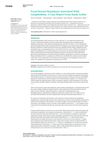
A 12-year-old girl in Saudi Arabia with Focal dermal hypoplasia showed skin and dental symptoms, highlighting the condition's variability and the need for personalized treatment.
 January 2023 in “Journal of cosmetic dermatology”
January 2023 in “Journal of cosmetic dermatology” Fractional lasers effectively treat alopecia areata, especially when combined with minoxidil or cortisol.
Minoxidil alone is as effective as combining it with PRP for treating female pattern hair loss.
 December 2022 in “Medical lasers”
December 2022 in “Medical lasers” Low-level laser therapy may help with hair regrowth in alopecia areata but its effectiveness for psoriasis and atopic dermatitis needs more research.
 December 2022 in “BMC women's health”
December 2022 in “BMC women's health” The CNC® prosthetic system improved body image in breast cancer patients with hair loss from chemotherapy but did not significantly change their psychological wellbeing.
 December 2022 in “International Journal of Women's Dermatology”
December 2022 in “International Journal of Women's Dermatology” The Sinclair Shedding Scale is effective for diagnosing Alopecia Areata Incognita and monitoring treatment success.
 October 2022 in “Dermatology practical & conceptual”
October 2022 in “Dermatology practical & conceptual” Most injecting drug users in the study had hepatitis C and skin problems, which moderately affected their quality of life.
 September 2022 in “Journal of The American Academy of Dermatology”
September 2022 in “Journal of The American Academy of Dermatology” Different types of hair loss are linked to COVID-19, with some types possibly increasing risk of getting the virus, while others may be triggered or worsened by the virus.
 February 2022 in “Endocrine connections”
February 2022 in “Endocrine connections” People with reproductive, thyroid disorders, and type 2 diabetes can experience voice changes, but more research is needed to understand this better.
 January 2022 in “Clinical dermatology open access journal”
January 2022 in “Clinical dermatology open access journal” Certain cannabinoids may help increase hair growth and could be useful for treating hair loss.
[object Object]  September 2021 in “Physiology News”
September 2021 in “Physiology News” The LGBTQ+ STEM @UCL Network helps increase visibility and support for LGBTQ+ individuals in STEM at University College London.
September 2021 in “Psychoneuroendocrinology” Nurses had higher stress levels during intense phases of the COVID-19 pandemic.
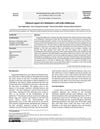 March 2021 in “Veterinary research forum”
March 2021 in “Veterinary research forum” A Holstein calf in Iran with a severe genetic skin disorder was euthanized due to incurable symptoms.
 December 2020 in “International Journal of Research in Dermatology”
December 2020 in “International Journal of Research in Dermatology” Many dermatologists in India find serum peptide formulations effective for treating hair loss.
 August 2020 in “International research journal of pharmacy”
August 2020 in “International research journal of pharmacy” Lifestyle changes and medication can improve the quality of life for women with PCOS by reducing complications.
 May 2020 in “Hair transplant forum international”
May 2020 in “Hair transplant forum international” Younger people and those with existing acne are more likely to get folliculitis after hair restoration surgery, but it doesn't affect the overall good hair growth result.
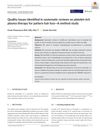 December 2019 in “Journal of cosmetic dermatology”
December 2019 in “Journal of cosmetic dermatology” Systematic reviews on platelet-rich plasma therapy for hair loss have many quality issues.
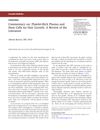 August 2019 in “Aesthetic Surgery Journal”
August 2019 in “Aesthetic Surgery Journal” PRP can boost hair growth and thickness, especially in early stages of hair loss, but its effectiveness varies and there's no set method or treatment frequency. Stem cells also show promise for increasing hair density.
 January 2019 in “Current research in diabetes & obesity journal”
January 2019 in “Current research in diabetes & obesity journal” A woman with type 2 diabetes developed alopecia areata, suggesting a link between the two autoimmune conditions.
January 2019 in “Journal of the American Academy of Dermatology” Childhood cancer survivors need better skin care and sun protection.
 January 2019 in “Springer eBooks”
January 2019 in “Springer eBooks” Acne can appear or persist in adulthood due to hormonal changes, external factors, or substance use, and requires appropriate treatment.
 December 2018 in “Journal of Patan Academy of Health Sciences”
December 2018 in “Journal of Patan Academy of Health Sciences” Many Chinese patients lose hair after weight loss surgery, especially women, and taking iron and zinc on their own doesn't help.
 May 2018 in “European Journal of Dermatology”
May 2018 in “European Journal of Dermatology” The first Japanese family with Marie Unna hereditary hypotrichosis showed hair condition improvement in a child and highlighted the risk of misdiagnosis.
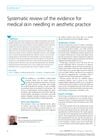 February 2017 in “Journal of Aesthetic Nursing”
February 2017 in “Journal of Aesthetic Nursing” Skin needling is a safe, effective, and affordable treatment for various skin issues and enhances other aesthetic procedures.


























